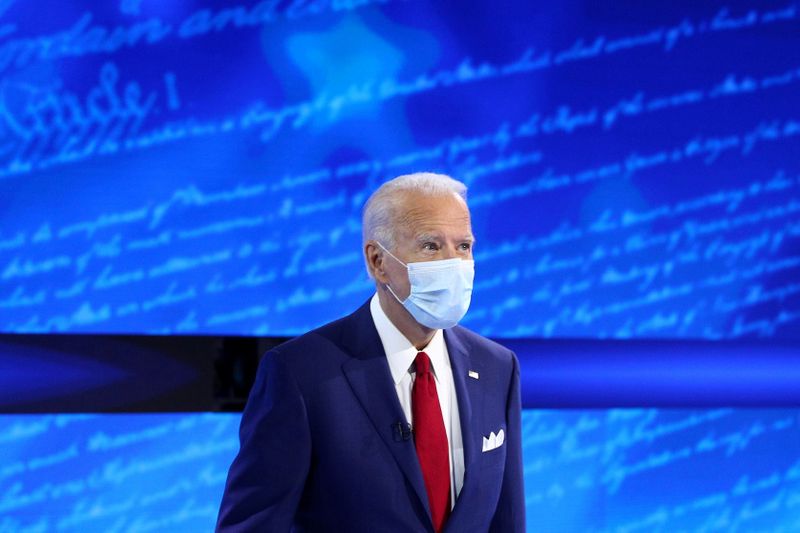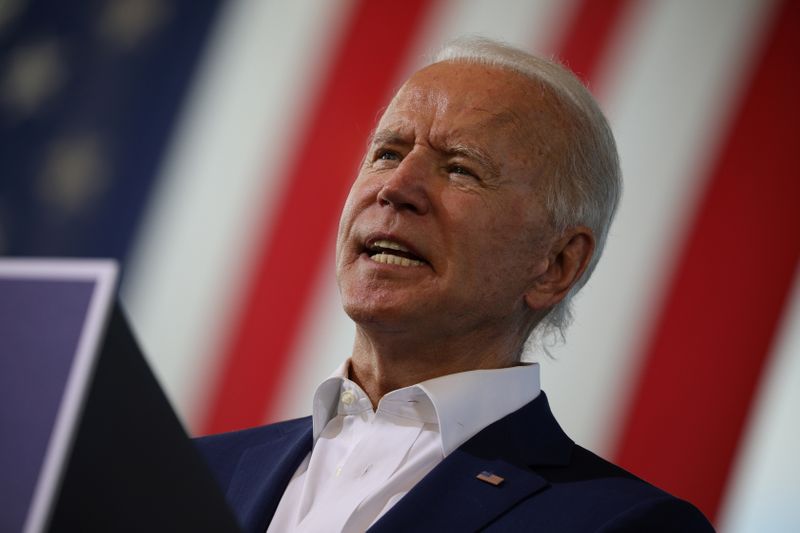By Howard Schneider
WASHINGTON (Reuters) - The Democratic party's sprawling presidential primary last spring offered a wide-open debate on economic policy ranging from the merits of wealth taxes and other ways to ease U.S. economic inequality to aggressive proposals for reducing reliance on fossil fuels.
Yet even a "blue wave" victory next month giving Democrats control of the White House and both chambers of Congress may strand that sort of transformational economic thinking on the sidelines until the battle against the coronavirus is won.
While an electoral victory by Democratic contender Joe Biden might shift the U.S. response to the pandemic, he would also have to restore public confidence in things like restaurant dining, and get the country's commercial and work life back to normal - in short, navigate massive uncertainties surrounding vaccines, public behavior, and divergent local approaches to a common health problem.
"It is extremely hard to imagine a sustainable, robust recovery absent virus control. So that is step one," Biden economic adviser Jared Bernstein said in a recent webcast discussion, when asked how an incoming administration would juggle a wide set of competing priorities.
"Part two," he said, will be the likely need for another fiscal package to help families and businesses through the current recession. After that will follow what Bernstein called the "more permanent lasting agenda" of investments in clean energy or broadening healthcare coverage.
The focus on the virus and the recession does not exclude pursuit of some longer-term aims, Bernstein said. For example, expanding and improving child care could help parents return to the workforce, and infrastructure investments could generate desperately needed jobs.
Still the state of the U.S. economy two weeks before the election means that, rather than a clean slate to write economic policy equal to the sweep of Democratic aspirations, Biden would face an ongoing pandemic, the aftermath of 22 million lost jobs, a public unable to mingle freely, and major industries suffering depressed demand.
Graphic: The missing trillions https://graphics.reuters.com/USA-ECONOMY/BIDEN/xklvymgwnvg/chart.png
EMERGING SCARS
Nathan Sheets, chief economist at PGIM Fixed Income, sees a troubling litany of problems: Jobs will be harder to find, the economy's productive capacity is lower, and many households and businesses will emerge with weaker balance sheets.
"Will those weaker balance sheets lead to less consumption, investment, less risk taking? These are scars that are emerging," Sheets said.
That suggests a presidential transition spent deciding whether federal dollars should be allocated for direct aid to families and local governments or for the more strategic reforms of Biden's "Build Back Better" agenda, say his proposed $2 trillion investment in clean energy, and whether to follow through on promised tax increases during a recession.
The more ambitious programs hinge not just on the virus, but the composition of the Congress.
While the larger economic proposals are high priorities, "if there is a Republican Senate Joe Biden is going to have to dramatically scale back his proposals," said Neera Tanden, president of the Democratic-aligned Center for American Progress think tank. "That is reality."
Big reform in a crisis is not impossible.
Barack Obama inherited a financial shock and recession when he became president in 2009 but still managed to pass the signature Affordable Care Act a year later - with Congress under full Democratic control.
'FACE OF A SITTING PRESIDENT'
There will not be a leisurely transition.
While coronavirus vaccines are in development, the timetable is unclear, and opinion polls show a significant public hesitance to get one.
"(Biden) will be responsible for restoring trust and setting a path the day after he is elected," said Douglas Holtz-Eakin, a Republican policy adviser and president of the American Action Forum think tank. He "needs to be prepared to have the public face of a sitting president pretty quickly...rolling out people who are clearly qualified and know how to run" agencies like the Centers for Disease Control and Prevention.
That could stymie attention to the larger vision of an economy reshaped to provide fairer outcomes and more opportunities for a broader set of people, a narrowing of economic gaps between Black and white, and progress toward a more sustainable energy mix.
The big unknown for a new administration: Just how long dislocation from the pandemic will last.
Economists expect economic output may remain below pre-pandemic levels for perhaps another year, with unemployment returning even more slowly to the low levels hit in 2019.
For a President Biden, that likely means a persistent economic drag that grows worse the longer the virus is untamed.

"Even just a pickup in the virus could certainly cause not just the worry of infections and deaths...but of people self-quarantining, not going outside, staying home more," Standard & Poor's Global Chief Economist Beth Ann Bovino said. "The economy would get a knockdown."
